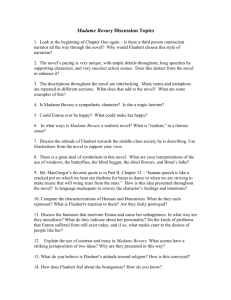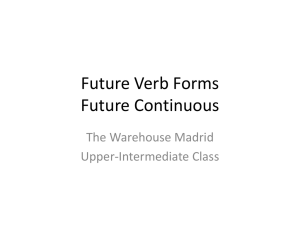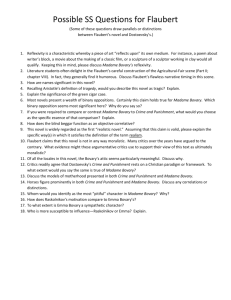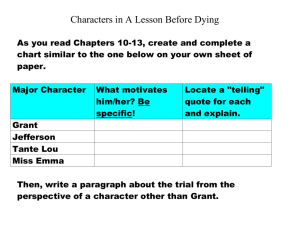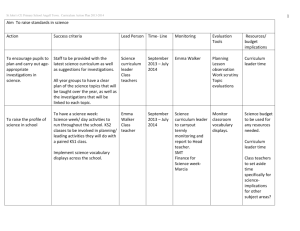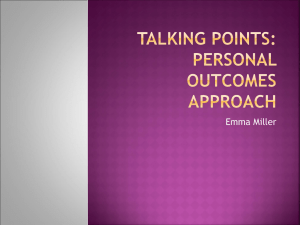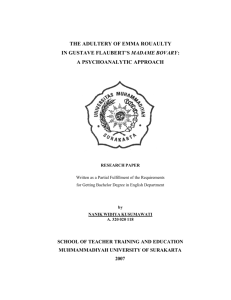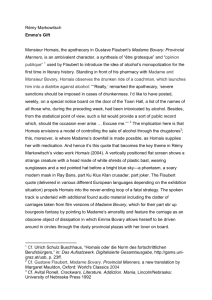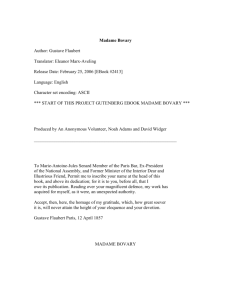The Fakery
advertisement
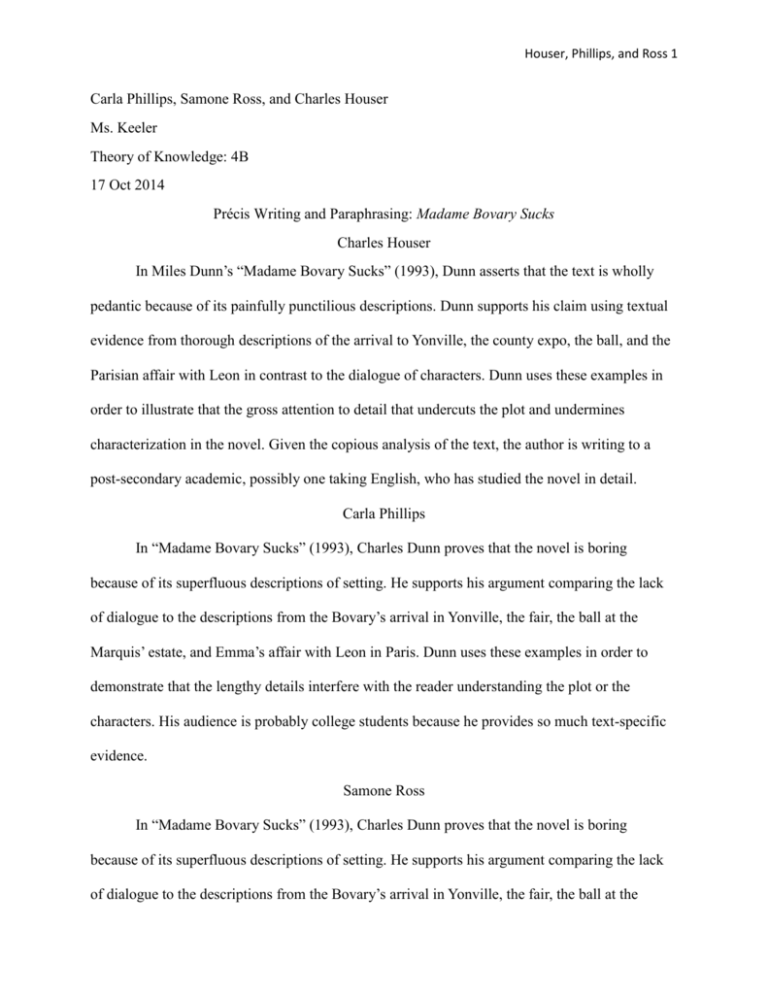
Houser, Phillips, and Ross 1 Carla Phillips, Samone Ross, and Charles Houser Ms. Keeler Theory of Knowledge: 4B 17 Oct 2014 Précis Writing and Paraphrasing: Madame Bovary Sucks Charles Houser In Miles Dunn’s “Madame Bovary Sucks” (1993), Dunn asserts that the text is wholly pedantic because of its painfully punctilious descriptions. Dunn supports his claim using textual evidence from thorough descriptions of the arrival to Yonville, the county expo, the ball, and the Parisian affair with Leon in contrast to the dialogue of characters. Dunn uses these examples in order to illustrate that the gross attention to detail that undercuts the plot and undermines characterization in the novel. Given the copious analysis of the text, the author is writing to a post-secondary academic, possibly one taking English, who has studied the novel in detail. Carla Phillips In “Madame Bovary Sucks” (1993), Charles Dunn proves that the novel is boring because of its superfluous descriptions of setting. He supports his argument comparing the lack of dialogue to the descriptions from the Bovary’s arrival in Yonville, the fair, the ball at the Marquis’ estate, and Emma’s affair with Leon in Paris. Dunn uses these examples in order to demonstrate that the lengthy details interfere with the reader understanding the plot or the characters. His audience is probably college students because he provides so much text-specific evidence. Samone Ross In “Madame Bovary Sucks” (1993), Charles Dunn proves that the novel is boring because of its superfluous descriptions of setting. He supports his argument comparing the lack of dialogue to the descriptions from the Bovary’s arrival in Yonville, the fair, the ball at the Houser, Phillips, and Ross 2 Marquis’ estate, and Emma’s affair with Leon in Paris. Dunn uses these examples in order to demonstrate that the lengthy details interfere with the reader understanding the plot or the characters. His audience is probably college students because he provides so much text-specific evidence. Paraphrase Gustave Flaubert assumed a novel manner of storytelling which Williams features in his paper. In the initial chapter, Charles’ fellow pupils narrate as a first-person plural ‘we’. For the remainder of the novel, an omniscient third-person narrates. Despite the seemingly objective approach, the narrator often opines, unequivocally in regard to Emma’s bourgeois attempts at refinement. The novel principally relates events via Emma while narrated in third-person. Flaubert has regularly employed free indirect discourse, a method in which characters’ emotions and ruminations are conveyed objectively as he or she experiences them. After Emma’s suicide, objective narration is assumed. Flaubert also constructs two ancillary titular characters with Charles’ mother and Charles’ first wife. The symbiosis among these three characters serves to juxtapose his own relationship with Emma. Flaubert alters his point-of-view to mirror the character. He superbly marries his narrative style with his subject. When Emma is listless, the writing decelerates, when she is roused, it hastens. The matrimonial and colloquial scenes accurately depict bucolic life and highlight Emma’s ennui. At the town exposition, Flaubert has switched between the scenes of Rodolphe’s seduction of Emma and the regional officiates speech about morality, which illustrates the duplicity of both speakers. In Paris, the dramatizing of the carriage’s rocking replaces the portrayal of Emma and Leon having sex. The vapidity of Emma’s religious fidelity is illuminated when Emma departs the church to embrace her lover. The cathedral scene, similar to the one where Emma entreats the priest, brooks Flaubert’s Houser, Phillips, and Ross 3 religious condemnation. The priest is too concerned with the visceral world to give Emma spiritual counseling. The reader experiences the Vaubyessard Ball through Emma’s observations that candidly depict the setting and characters. The sensual stillness of Madame Bovary cannot be misinterpreted. This is your partner’s paraphrase that came immediately after yours. Williams features in his paper. In the initial chapter, Charles’ fellow pupils narrate as a first-person plural ‘we’. For the remainder of the novel, an omniscient third-person narrates. Despite the seemingly objective approach, the narrator often opines, unequivocally in regard to Emma’s bourgeois attempts at refinement. The novel principally relates events via Emma while narrated in thirdperson. Flaubert has regularly employed free indirect discourse, a method in which characters’ emotions and ruminations are conveyed objectively as he or she experiences them. After Emma’s suicide, objective narration is assumed. Flaubert also constructs two ancillary titular characters with Charles’ mother and Charles’ first wife. The symbiosis among these three characters serves to juxtapose his own relationship with Emma. Flaubert alters his point-of-view to mirror the character. He superbly marries his narrative style with his subject. When Emma is listless, the writing decelerates, when she is roused, it hastens nothing. And keep going. Houser, Phillips, and Ross 4 Works Cited Dunn, Charles. “Madame Bovary Sucks.” The Journal of Self-Loathing and Vicks VapoRub. 1993:492-6.
